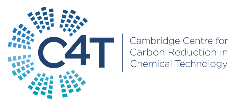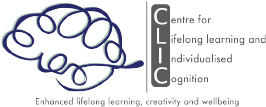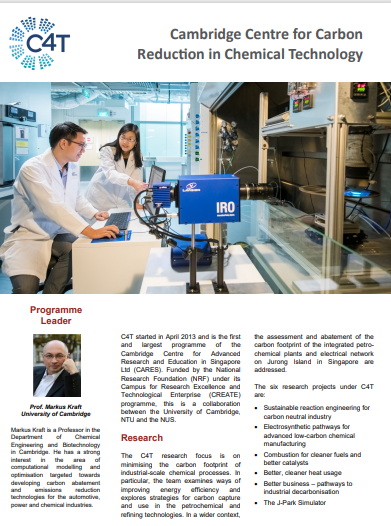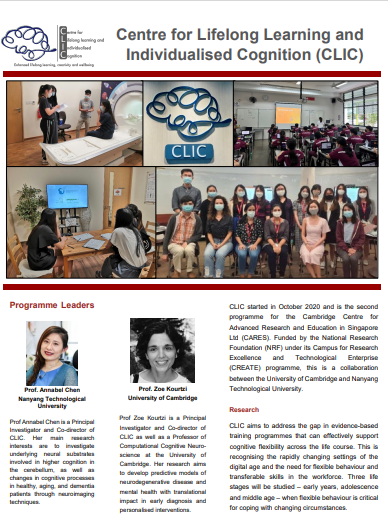CARES

The Cambridge Centre for Advanced Research and Education (CARES) was established in 2013 as the University of Cambridge’s first research centre outside the UK. It brings together researchers from the University of Cambridge, Nanyang Technological University and National University of Singapore to work on problems relevant to Singapore and the world at large.
CARES’ largest programme is the Cambridge Centre for Carbon Reduction in Chemical Technology, which commenced in 2013 when CARES opened. This is a collaborative effort involving researchers from University of Cambridge, Nanyang Technological University and National University of Singapore.
A further large programme began in October 2020 - the Centre for Lifelong Learning and Individualised Cognition (CLIC). CLIC brings together researchers from University of Cambridge and NTU to focus on the neuroscience of learning.
CARES is also hosting an Intra-CREATE project called Cities Knowledge Graph, a collaborative project between the University of Cambridge and the Singapore-ETH Centre. The project aims to harness rapidly growing and diversifying data streams to improve the planning and design of cities.
CARES is a research partner in the Pharmaceutical Innovation Programme Singapore (PIPS), a public-private consortium that aims to develop full process automation in a laboratory to support R&D and manufacturing.
The latest CARES-hosted project is AMPLE, a collaborative project between CARES and NTUitive, which has emerged from research in the C4T programme that aims to rapidly scale-up nanomaterial technologies for high quality and low cost.

The Cambridge Centre for Carbon Reduction in Chemical Technology (C4T) represents a dynamic partnership between some of the world-leading scientists and engineers at the University of Cambridge, Nanyang Technological University and the National University of Singapore.
C4T answers the question of how to positively contribute to Singapore’s ratification of the Paris Agreement on climate change while ensuring the country’s progress and prowess in economic, technological, environmental and social dimensions. C4T Phase 2, which began in November 2018, systematically investigates the raw materials, processes and products of the local chemical industry and investigates technologies to lower the carbon footprint of this major pillar of Singapore’s economy. The Phase 2 programme is designed to leverage the skilled human resource, cutting-edge scientific research and the vibrant enterprise demonstrated in Phase 1.
Phase 2 will undertake research in six key areas known as Integrated Research Projects:
IRP 1: Sustainable reaction engineering for carbon neutral industry
IRP 2: Electrosynthetic pathways for advanced low-carbon chemical manufacturing
IRP 3: Combustion for cleaner fuels and better catalysts
IRP 4: Better, cleaner heat usage
IRP BB: Better business – pathways to industrial decarbonisation
IRP JPS: The J-Park Simulator
Phase 2 sits at the heart of Singapore’s global research and development hub and paves the way for a prosperous, energy-efficient, low-emission eco-city. The scientific techniques, the technologies, the toolkits and most importantly the learning gained through the programme will help assess the techno-economic role of both current (commercial) and novel (R&D stage) technology routes in decarbonising the chemicals and energy sector, whilst simultaneously enriching the talent pool in Singapore by training the next generation of scientists and engineers, supplemented with international expertise and an innovation-driven entrepreneurial ecosystem.

As technology and globalisation change the nature of labour markets and increase the demand for high levels of skill, the need for individuals to be able to develop new skills during their working careers is becoming increasingly pressing.
The Centre for Lifelong Learning and Individualised Cognition (CLIC) aims to address this societal change by developing innovative research in the science of learning and translating it to educational and real-life applications across the life course. We will adopt an integrated interdisciplinary approach that marries cross-disciplinary expertise and methodologies to target three life periods (early years, adolescence, middle age) when flexible behaviour is critical for coping with highly changing circumstances.
CITIES KNOWLEDGE GRAPH
Cities Knowledge Graph is an Intra-CREATE collaborative project under the urban systems theme. The project brings together expertise from Cambridge CARES as the host institution of the project, and SEC (the Singapore-ETH Centre, established by ETH Zürich). The team is led by principal investigators from the University of Cambridge and ETH Zürich.
The project aims to harness rapidly growing and diversifying data streams to improve the planning and design of cities. It will do so by developing an innovative digital platform designed to combine data and share knowledge about cities, and to inject new precision and responsiveness to static instruments of planning, such as the city master-plan.
Download the CARES C4T Factsheet


Contact Us
Website:
[http://www.cares.cam.ac.uk](http://www.cares.cam.ac.uk/](http://www.cares.cam.ac.uk](http://www.cares.cam.ac.uk/)
Tel: +65 6601 5445
Where to Find Us
1 Create Way
CREATE Tower, #05-05
Singapore 138602
Publications
Website:
https://www.cares.cam.ac.uk/publications/

